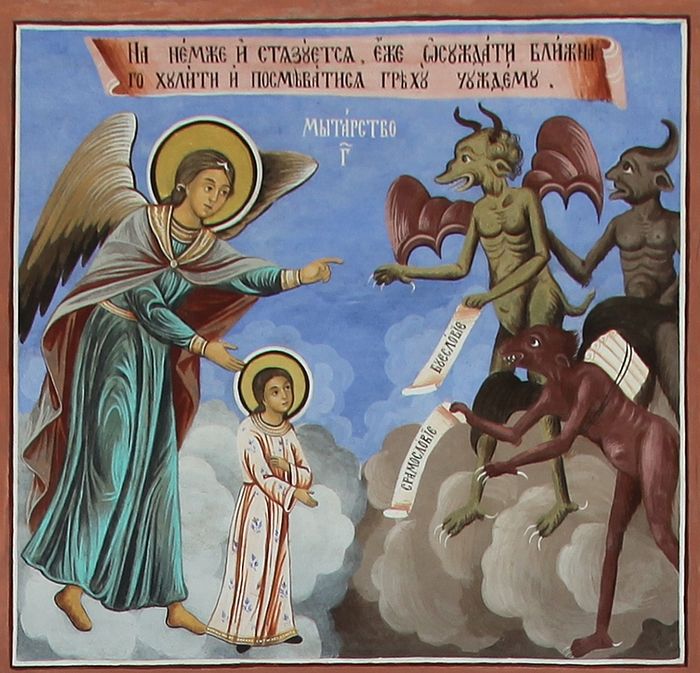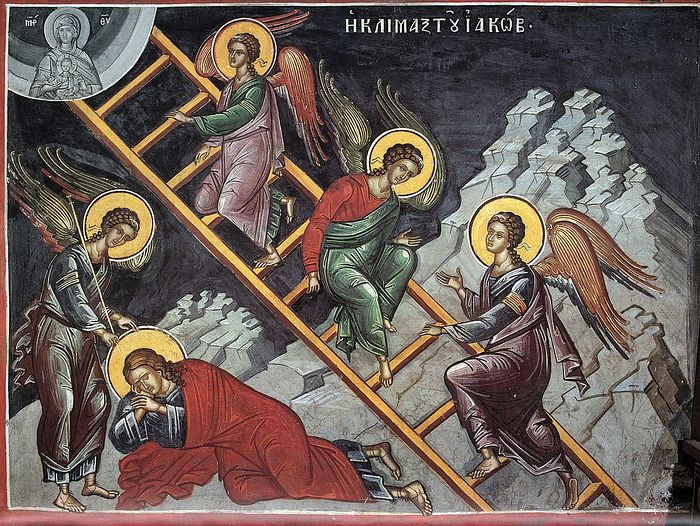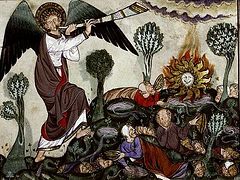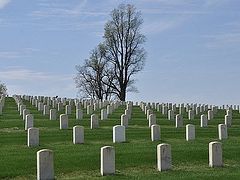See Conversation 1: What happens to the soul after death?
Where in the Bible do they talk about aerial tollhouses—those obstacles that the forces of darkness put in the way of souls rising after death to heaven through the space under heaven? Why do the demons wait for a soul in the under-heavens? What and who can help a soul pass through the tollhouses? How should we view the fact that there are differences between patristic works and the lives of the saints in explanations of the tollhouses? How can we answer critics of the teaching on the tollhouses?
Biblical testimony on the tollhouses
Primarily testifying to the tollhouses is the Holy Scripture where it quite specifically talks about the coming trials in the air. In the Epistle to the Ephesians is written: And you hath he quickened, who were dead in trespasses and sins; Wherein in time past ye walked according to the course of this world, according to the prince of the power of the air, the spirit that now worketh in the children of disobedience (Eph. 2:1-2). Satan rules in the air. And further in this Epistle it says, Put on the whole armour of God, that ye may be able to stand against the wiles of the devil. For we wrestle not against flesh and blood, but against principalities, against powers, against the rulers of the darkness of this world, against spiritual wickedness in high places. Wherefore take unto you the whole armour of God, that ye may be able to withstand in the evil day, and having done all, to stand (Eph. 6:11-13). The “evil day” is the day of death, and the words, “done all” [in Slavonic this phrase translates as “overcome all”] points to the tollhouses. The words, “against spiritual wickedness in high places” [in Slavonic, “against spirits of evil in the under-heavens”] hints that on our path to the heavenly Kingdom of God—not in the upper strata of the atmosphere but precisely on our path to the heavenly Kingdom of God—spirits of evil will be warring against us (the “tax collectors”)[1], which obstruct each soul from ascending through the tollhouses and prevent them from coming closer to the Heavenly Kingdom of God.
In explaining the words, “in high places” or “under heaven”, St. Jerome writes, “We must understand that our struggle is not against flesh and blood, but against certain unseen powers, against the princes of darkness, which encompass this world, spreading error amidst unbelieving people, and against the spirits of wickedness, which abide in the aerial spaces. This does not mean that the demons spend their lives in the Heavens, but that they are in the air over us and have received the name (aerial).[2]
St. Theodoret of Cyprus is not entirely in agreement with Jerome—at least that the space between the heavenly firmament and the earth entirely belongs to the devil. After all, churches sanctify [in the litany] the “seasonable weather” [the Slavonic words in this litany would be translated literally as, “good-blending of airs” (that is, they disperse unclean spirits), especially monasteries and sketes, as well as Orthodox Christian homes (where morning and evening prayers are read), places where cross processions take place, which are censed, or where holy things are carried along the streets (especially the Holy Gifts)—there the air and earth, etc. are undoubtedly cleansed. The ringing of church bells especially cleanses nature and even stops epidemics (in Soviet Russia, bell-ringing was banned because it hindered people from concentrating on soviet films in theaters).
This is why it is so important to conduct the dying with Unction, confession, and Communion. St. Theodoret of Cyprus writes, “The Apostle clearly taught us that the devil once was entrusted with power over the air. Having lost it for his deceitfulness, he became the teacher of impiety and evil. Nevertheless, he does not have mastery over all, but only over those who do not accept divine teachings, who were called by the apostle, “children of disobedience”.[3]
In Psalm 113 it is written, The heaven of heaven belongeth to the Lord, but the earth He gave unto the sons of men (Ps. 113:24). But the spirits of wickedness in high places are located between heaven and earth, for “the heaven belongs to the Lord, but the earth He gave to the sons of man”—but it will not always be this way. And in this sense the teaching on the aerial tollhouses is a kind of teaching about the freeing of the very space between heaven and earth (freeing of the high places, or “under-heaven”). This is what will happen on the day of the Second Coming of Christ, when there will be the meeting of the Bridegroom (Christ) and His Bride (the Church), Then we which are alive and remain shall be caught up together with them in the clouds, to meet the Lord in the air: and so shall we ever be with the Lord (1 Thess. 4:17).
Without a doubt, every person must ascend to Heaven, For our conversation is in heaven; from whence also we look for the Saviour, the Lord Jesus Christ (Philip. 3:20), but whether we reach it or not depends on many causes. The words, “from whence also we look for the Savior” shows us that this is not an allegorical (spiritual) meaning, but absolutely specific heavens. For, it was said of the very Ascension of the Lord, And when he had spoken these things, while they beheld, he was taken up; and a cloud received him out of their sight. And while they looked stedfastly toward heaven as he went up, behold, two men stood by them in white apparel; Which also said, Ye men of Galilee, why stand ye gazing up into heaven? this same Jesus, which is taken up from you into heaven, shall so come in like manner as ye have seen him go into heaven (Acts 1:9-11).
Jacob’s Ladder
The Orthodox teaching on the Kingdom of Heaven and the ascent to it or being cast down from the path to it of human souls can be built upon and supported by the Biblical story of “Jacob’s ladder”, with the explanation of this vision by Blessed Jerome of Stridon. We read about the vision: And Jacob went forth from the well of the oath [Beersheba], and departed into Charrhan. And came to a certain place and slept there, for the sun had gone down; and he took one of the stones of the place, and put it at his head, and lay down to sleep in that place, and dreamed, and behold a ladder fixed on the earth, whose top reached to heaven, and the angels of God ascended and descended on it. And the Lord stood upon it, and said, I am the God of thy father Abraam, and the God of Isaac; fear not, (Gen. 10-13).
In his work, “Treatise on the Psalms”, Blessed Jerome of Stridon writes: “Look at our ascetic (Jacob)—he ran away from a very cruel person, he saved himself from his brother and found help in a rock. This rock is Christ. This rock is the support for all who are persecuted; but for the unbelieving Jew this is a “stumbling stone and rock of offence (Rom. 9:32). It is written, “Jacob beheld a ladder fixed on the earth, whose top reached to heaven, and the angels of God ascended and descended on it.” Note what was said: He saw angels ascending—he saw Paul ascending. He saw angels descending—he saw Judas the betrayal cast down. He saw the angels ascending—holy people rising from earth to heaven. He saw angels descending—the devil, the demons and his minions cast down from heaven. And this is enormously difficult—to ascend from earth to heaven, for we more easily fall than rise. And if I stand upon the first step, then how many more are there before I reach the heavens? And if I then ascend the second, third, fourth, tenth steps, then what good is to me if I do not reach the top? Let’s suppose that for me this ladder consists of fifteen steps and I have reached the fourteenth. But if I do not reach the fifteenth, then what good is it to me that I have reached the fourteenth? If I reach the fifteenth and then fall, then the greater ascent means the greater fall to me.”[4]
And if hell is not meant for people, for it was “prepared for the devil and his angels” (Matt. 25:41), then the ascent to the Heavens along the ladder seen by Jacob and described in stories about the toll-houses will be presented to every person. And naturally, the demons will try in any way they can to prevent people from reaching the place where they themselves once dwelt; and the devil, who was a murderer from the beginning, and abode not in the truth (Jn. 8:44); and, How has Lucifer, that rose in the morning, fallen from heaven! He that sent orders to all the nations is crushed to the earth (Is. 14:12). Only martyrs and great saints ascend to Heaven without going through the tollhouses. According to Church Tradition, the Most Holy Virgin Mary ascended to Heaven in her most pure body. The hymns of praise to her sung on the feast of the Dormition testify to this.
Someone might protest: Aren’t the demons now in hell? It is written, And, behold, they (that is, the demons) cried out, saying, What have we to do with thee, Jesus, thou Son of God? art thou come hither to torment us before the time? (Matt. 8:29). The New Testament shows us that the demons dwell in demon-possessed people (cf. Matt. 8:28), that they can enter into animals (Matt. 8:32), but the main place of their habitation and reign is “under heaven”. As we read earlier, the war between people and the powers of evil continues according to the prince of the power of the air, the spirit that now worketh in the children of disobedience (Eph. 2:2). That is, ruling in the air, he (the devil) acts on earth “now in the children of disobedience.” And it remains for us to weep along with the prophet Jeremiah and pray to God, Persecute them in anger, and … consume them from under the heaven, O Lord (Lam. 3:66). The devil’s power over the earth will be restored only during the days of antichrist and only for three and a half years (cf. Rev. 20:7).
Earlier we noted that the martyrs and perfect saints ascend unhindered to the heavens after their death. But in the Bible are also described two bodily ascents into the Heavens: righteous Enoch and the prophet Elias. And again the description leaves no doubt about the reality of an ascent to the Kingdom of Heaven through the space between our sky and our earth. It is written: And Enoch was well-pleasing to God, and was not found, because God translated him (Gen. 5:24); and also: And it came to pass as they were going, they went on talking; and, behold, a chariot of fire, and horses of fire, and it separated between them both; and Elias was taken up in a whirlwind as it were into heaven. And Elisha saw, and cried, Father, father, the chariot of Israel, and the horseman thereof! And he saw him no more: and he took hold of his garments, and rent them into two pieces. And Elisha took up the mantle of Elias, which fell from off him upon Elisha; and Elisha returned, and stood upon the brink of Jordan; and he took the mantle of Elias, which fell from off him… (4 Kings 2:11-14).
Coming next: Part 2. Patristic Testimony of the Tollhouses






My humble suggestion would be for you to find an Orthodox church that you can get to, call the priest up, tell him your situation, and ask if you could attend Catechism classes. Then go and be respectful, listen attentively, and ask questions when appropriate.
If you pay attention, you will learn more in a few months than you did in a lifetime at a Protestant church. I'm not trying to offend you, just shooting you straight.
The Orthodox teachings are indeed consistent with the Holy Scriptures. They are in fact so much more consistent with the Holy Scriptures than your former churches, that it may make you uncomfortable. Until you do your homework and realize that you were taught all wrong and the Scriptures are full of so much more than you realized, but the problem was that your previous churches just skipped over the parts they didn't understand and never talked about those parts.
You may wish to read:
Life after death - Metr. Hierotheos of Nafpaktos
Trampling Down Death by Death - Fr Spyridon Bailey
Spiritual Counsels IV - St Paisios
How our departed ones live - Monk Mitrophan
Eternal Mysteries beyond the grave - Archimandrite Panteleimon.
All these and not to mention the prayers of the Church teach that we will face a trial at the departure of our soul from the body (Toll Houses). Best face up to that fact and prepare your and your parishioners' souls for that fact now.
Tragic that modern day priests seek to overturn and lift up their heels against the teachings of saints from Saint Anthony the Great, Saint Makarios the Great, Saint Ephraim the Syrian, Saint John of Damaskus, St John of Kronstadt, St Paisios, to modern day elders such as Elder Joseph the Hesychast, Elder Thaddeaus (Our thoughts determine our lives) etc. referring to their holy instructive teachings as decorative harmful seeds of dreams. Truly sorrowful, and even more so by virtue of the fact that it is in fact these persons whose philosophies are a byproduct of their western upbringing and school of thought